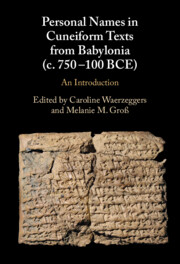This volume offers a practical introduction to the repertoire of personal names recorded in cuneiform texts from Babylonia in the first millennium BCE. In this period, individuals moved freely as well as involuntarily across the ancient Middle East, leaving traces of their presence in the archives of institutions and private persons in southern Mesopotamia. The multilingual nature of this name material poses challenges for students and researchers who want to access this data for social historical research. This volume offers guidelines and tools to help users navigate this difficult material. The idea for this volume emerged at a training week for graduate students organised by the team of the ERC project Persia & Babylonia (Leiden) with Paola Corò (Venice) at Ca’ Foscari University in 2018. During this week, participating students learnt about the many-faceted name material in Neo-Babylonian and Late Babylonian sources, including names in languages other than Akkadian, such as Egyptian, Anatolian, Hebrew, Aramaic, Greek, Old Persian, and Elamite. The present volume is based on the conversations held by students and teachers in Venice. We wish to thank our host Paola Corò and Ca’ Foscari University for their hospitality in Venice, Nicky van de Beek for coordinating the event, and all participants of the training week for their input. This volume is published open access thanks to the financial support of the European Research Council (Consolidator Grant 682241 Persia & Babylonia).
Preface
Published online by Cambridge University Press: 02 January 2024
Information
- Type
- Chapter
- Information
- Personal Names in Cuneiform Texts from Babylonia (c. 750–100 BCE)An Introduction, pp. xvPublisher: Cambridge University PressPrint publication year: 2024
- Creative Commons
- This content is Open Access and distributed under the terms of the Creative Commons Attribution licence CC-BY-NC-ND 4.0 https://creativecommons.org/cclicenses/
